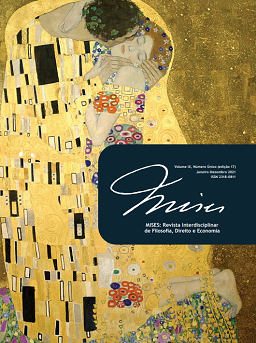The role of the State in the Origin and Institutional Evolution of Money in the Light of the Austrian School of Economics
DOI:
https://doi.org/10.30800/mises.2021.v9.1390Keywords:
Austrian School, Money, Origin, Evolution, StateAbstract
This paper aims to discuss the State’s role in the origin and in the institutional evolution of money in the light of the Austrian School of Economics. This research developed from the context of virtual currencies, which has attracted considerable academic interest in the last few years. Therefore, we employed the theory of the origin of money according to Menger (1985, 2007, 2009), the concept of extended order proposed by Hayek (1948, 1948a, 2017), the theory of market processes as stated by Barbieri (2001), and the theory of institutions developed by Angeli (2007). Considering the context of the virtual currencies and the behavior of the fiat money, it is understood that the State acts as a clog in the process, performed by the market, of the selection of currencies that best carries out their essential functions of medium of exchange, unit of account and storage of value. Similarly, the State harms the process of correction of flaws in the functioning of the financial system.
Downloads
References
BARBIERI, Fábio. O Processo de Mercado na Escola Austríaca Moderna. São Paulo: FEA/USP, 2001. (Dissertação de Mestrado).
______. História do Debate do Cálculo Econômico Socialista. São Paulo: FEA/USP, 2004. (Tese de Doutoramento).
______. A Economia Falibilista de Hayek. IN: XAVIER, Dennys Garcia (org.). F.A. Hayek e a Ingenuidade da Mente Socialista. São Paulo: LVM Editora, 2019, p. 175-204.
BARBIERI, Fábio; Feijó, Ricardo Luis Chaves. Metodologia do pensamento econômico: O modo de fazer ciência dos economistas (1 ed.). São Paulo: Atlas, 2013.
BERNARDO, Marcel Pereira; BERNARDELLI, Luan Vinícius; NORI, Rodrigo Braian. A História da Moeda – Uma Proposta de União entre Teoria Econômica e Etnografia. São Paulo: Mises: Revista Interdisciplinar de Filosofia, Direito e Economia. vol. 7 n. 2 . Maio-Agosto, 2019. Disponível em: https://www.revistamises.org.br/misesjournal/article/view/1113/647. Acesso em 13. jul. 2020.
CATÃO, Adrualdo de Lima; PINTO, Tamara Luiza Dall Agnol. As Criptomoedas e a Liberdade Contratual no Direito Privado Internacional e no Sistema Jurídico Brasileiro. São Paulo: Mises: Revista Interdisciplinar de Filosofia, Direito e Economia. vol. 8, 2020. Disponível em: https://www.revistamises.org.br/misesjournal/article/view/1325/682 . Acesso em 13. jul. 2020.
GRAF, Konrad S. Sobre as Origens do Bitcoin: Estágios da Evolução Monetária – Parte I. São Paulo: Mises: Revista Interdisciplinar de Filosofia, Direito e Economia. vol. 3. n. 2. Julho-Dezembro, 2015; p. 427-440. Disponível em: https://www.revistamises.org.br/misesjournal/article/view/779/463. Acesso em 13. jul. 2020.
______. Sobre as Origens do Bitcoin: Estágios da Evolução Monetária – Parte II. São Paulo: Mises: Revista Interdisciplinar de Filosofia, Direito e Economia. vol. 4. n. 1. Janeiro-Junho, 2016; p. 121-139. Disponível em: https://www.revistamises.org.br/misesjournal/article/view/827/511. Acesso em 13. jul. 2020.
HAYEK, Friedrich A. Economics and Knowledge. IN: ______. Individualism and Economic Order. Chicago: The University of Chicago Press, 1948. p. 33-56.
______. The Use of Knowledge in Society. IN: ______. Individualism and Economic Order. Chicago: The University of Chicago Press, 1948a. p. 77-91.
______. Denationalisation of Money ¬– The Argument Refined: An Analysis of the Theory and Practice of Concurrent Currencies. (3 ed). London: The Institute of Economic Affairs, 1990.
______. Os Erros Fatais do Socialismo: Por que a teoria não funciona na prática (1 ed.). Barueri: Faro Editorial, 2017.
LORENZON, Geanluca. Ciclos Fatais: Socialismo e Direitos Humanos. São Paulo: Instituto Ludwig von Mises Brasil, 2017.
MANKIW, N. Gregory. Introdução à Economia: Tradução da 3a Edição Norte-Americana. São Paulo: Cengage Learning, 2008.
MENGER, Carl. Investigations into the Method of the Social Sciences with Special Reference to Economics. New York: New York University Press, 1985.
______. Principles of Economics. Auburn: Ludwig von Mises Institute, 2007.
______. The Origins of Money. Auburn: Ludwig von Mises Institute, 2009.
MISES, Ludwig von. The Theory of Money and Credit. New Haven: Yale University Press, 1953.
______. Ação Humana: Um Tratado de Economia (3 ed.). São Paulo: Instituto Ludwig von Mises Brasil, 2010.
SENNHOLZ, Hans. The Monetary Writings of Carl Menger. IN: ROCKWELL JR., Llewellyn H. The Gold Standard: Perspectives in the Austrian School. Auburn: Ludwig von Mises Institute, 1992, p. 19-34.
ULRICH, Fernando. Bitcoin: A moeda na era digital (1 ed.). São Paulo: Instituto Ludwig von Mises Brasil, 2014.
ZELMANOVITZ, Leonidas. O Padrão-Ouro não é uma alternativa adequada para os problemas monetários atuais. São Paulo: Mises: Revista Interdisciplinar de Filosofia, Direito e Economia. v.I; n. 1, p. 87-105, 2013. Disponível em: https://www.revistamises.org.br/misesjournal/article/view/195/119. Acesso em 13. jul. 2020.
Downloads
Published
How to Cite
Issue
Section
License
Copyright (c) 2021 MISES: Interdisciplinary Journal of Philosophy, Law and Economics

This work is licensed under a Creative Commons Attribution 4.0 International License.

This Journal is licensed under a Creative Commons Attribution 4.0 International License.


















